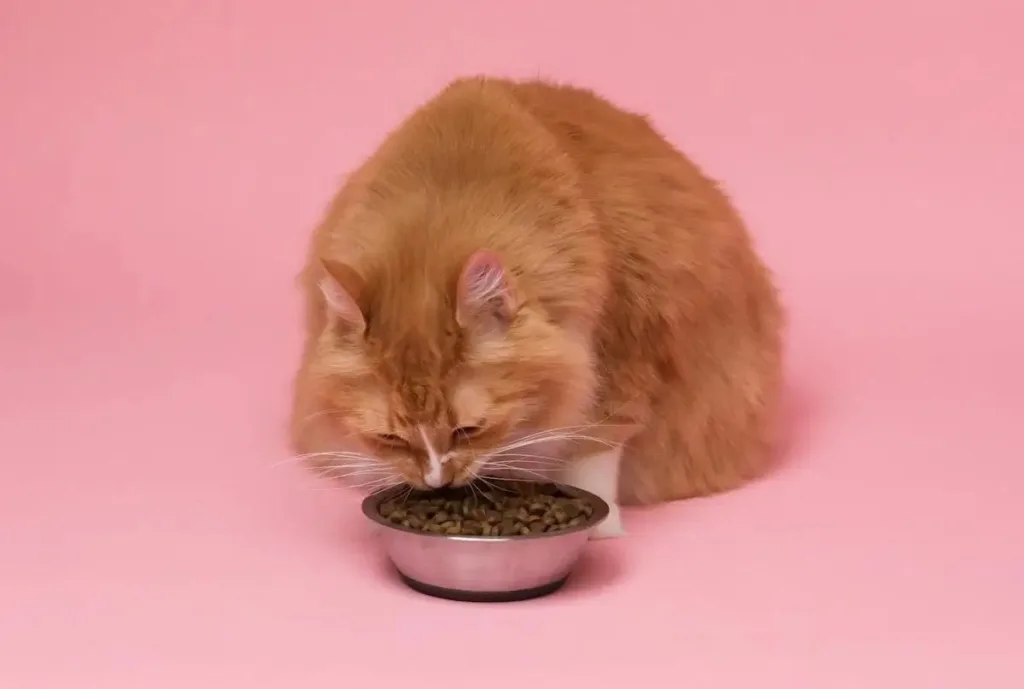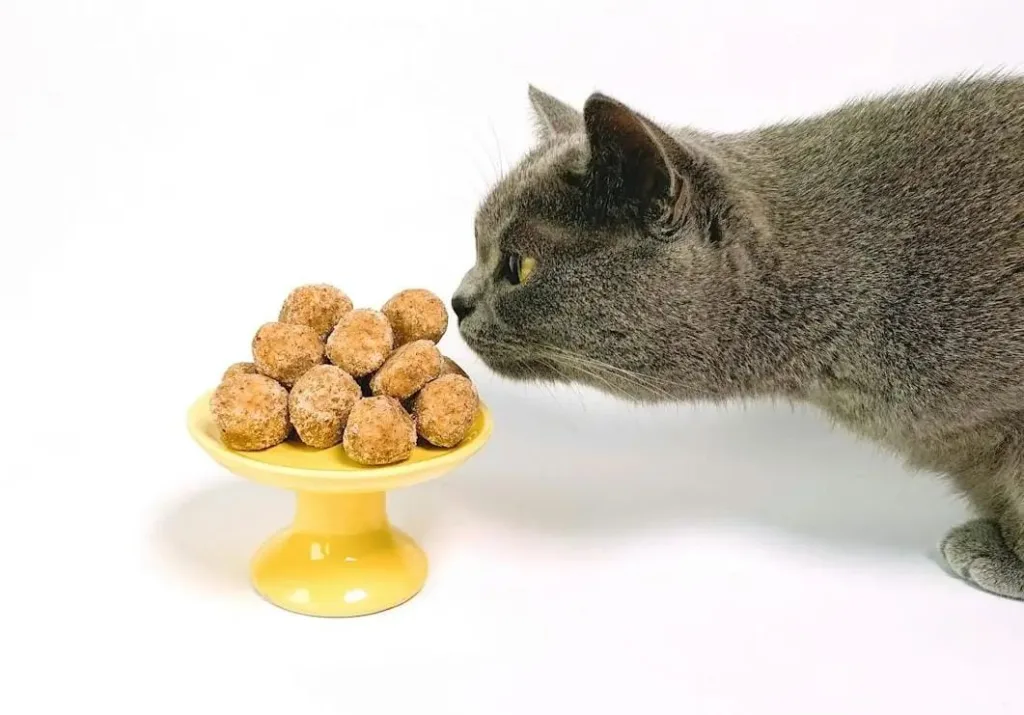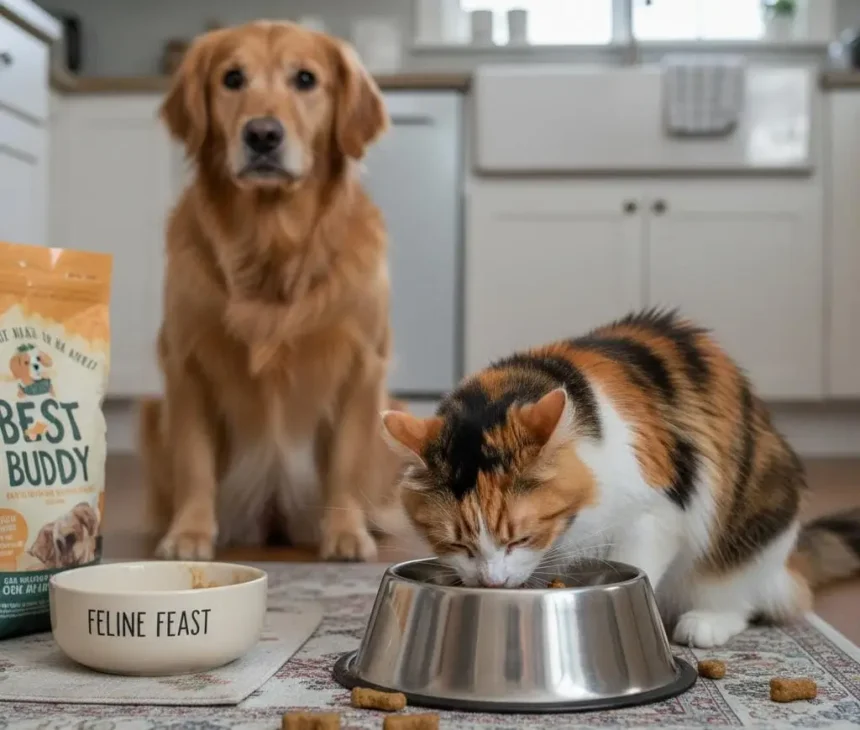If you share your home with both cats and dogs, you’ve probably caught your cat nibbling on the dog’s kibble. It might seem harmless — after all, it’s just pet food — but cats and dogs have very different dietary needs.
Cats are obligate carnivores, which means they must get nutrients only found in animal tissue. Dogs are omnivores and can digest a variety of plant and animal materials. While a few bites of dog food won’t harm your cat, replacing cat food with dog food long-term can lead to serious nutritional deficiencies.
Why Cats and Dogs Need Different Food
Though both animals eat meat, their biology is entirely different. Cats have evolved as hunters relying on prey — small mammals, birds, and fish — for energy and hydration. Dogs, in contrast, have adapted to more varied diets that include vegetables and grains.

Cat food, therefore, is much higher in protein, certain vitamins, and amino acids than dog food. Dog food lacks key nutrients cats cannot make themselves, which can lead to long-term health issues.
Essential Nutrients Cats Need (That Dog Food Lacks)
Here are the nutrients that make cat food irreplaceable — and why your feline can’t thrive on dog food:
1. Taurine
Taurine is a vital amino acid that supports heart function, vision, and reproduction. Cats cannot produce enough taurine naturally, while dogs can. Most dog foods don’t contain sufficient taurine for cats, and deficiency can lead to blindness and heart disease.
2. Vitamin A
Cats require preformed Vitamin A (retinol) from animal sources. Dog foods usually rely on plant-based carotenoids, which cats can’t convert efficiently. Without enough Vitamin A, your cat could suffer from poor vision, weak immunity, and dry skin.
3. Arachidonic Acid
This omega-6 fatty acid helps regulate inflammation, skin health, and fertility. Dogs can make arachidonic acid from plant oils; cats cannot. Dog food rarely includes enough for cats’ needs.
4. Arginine
Cats need arginine for detoxifying ammonia from protein metabolism. Even a single meal low in arginine can cause neurological issues, drooling, vomiting, or seizures in cats.
5. High-Quality Animal Protein
Protein quality matters more than quantity. Cats require protein from animal sources with all essential amino acids. Many dog foods include grains and plant proteins that aren’t bioavailable enough for cats.
What Happens If Cats Eat Dog Food Regularly?

If your cat sneaks a bite occasionally, don’t panic — short-term exposure won’t cause harm.
But consistent feeding over days or weeks can result in:
- Digestive upset: Vomiting, diarrhea, and bloating from different fat or fiber levels.
- Poor coat and skin: Due to protein and fatty acid imbalance.
- Lethargy and weight loss: From inadequate calorie density and missing nutrients.
- Heart problems (Dilated Cardiomyopathy): Linked to taurine deficiency.
- Vision loss or blindness: Caused by long-term vitamin A and taurine deficiencies.
- Reproductive failure: In breeding cats or nursing queens.
Kittens and senior cats are especially vulnerable because their bodies can’t compensate for nutritional gaps.
Is Dog Food Ever Safe for Cats?
- A small amount occasionally: If your cat eats a few bites of dog food by mistake, it’s okay.
- Short-term emergency feeding: If you’ve run out of cat food, a day or two on dog food won’t hurt, but supplement with cooked meat or canned tuna and return to proper cat food quickly.
- Long-term feeding: Never recommended. Even premium dog foods don’t meet feline nutrient profiles set by AAFCO (USA) or FEDIAF (Europe).
What to Do If Your Cat Eats Dog Food Often
- Observe your cat’s behavior and health. Look for reduced appetite, dull fur, fatigue, or vision issues.
- Gradually reintroduce cat food. Transition over 5–7 days to avoid stomach upset.
- Encourage hydration. Offer fresh water and wet cat food to restore moisture balance.
- Consult a vet if symptoms persist. Bloodwork can detect taurine or vitamin deficiencies early.
- Prevent future access. Feed pets separately or elevate the dog’s bowl.
Global Perspective: Feeding Cats Safely Worldwide
In some regions, cat food is expensive or hard to find, so owners substitute dog food. If you face this situation, aim for:
- Dog food with animal protein as the first ingredient.
- Supplement with cooked chicken, liver, or fish for taurine and Vitamin A.
- Avoid foods with onion, garlic, or xylitol, which are toxic to cats.
- Seek local brands labeled “complete and balanced for cats” — even if not premium.
Cats thrive on diets aligned with their natural prey profile, regardless of geography. Hydration, high-quality protein, and proper amino acid balance remain essential everywhere.
FAQ
What happens if my cat eats dog food every day?
Feeding dog food daily can cause malnutrition, heart issues, and vision problems over time due to missing feline-specific nutrients.
Why is dog food bad for cats?
Dog food is formulated for omnivores, not carnivores. Cats need higher protein, taurine, and vitamin A levels than dog food provides.
Can I give my cat dog food in an emergency?
Yes — a small serving once in an emergency is fine. However, always switch back to nutritionally complete cat food as soon as possible.
What should I feed my cat instead of dog food?
Feed high-quality, AAFCO-approved cat food rich in animal protein. In a pinch, plain cooked chicken or fish can be a temporary substitute — just avoid seasoning or bones.
Key Takeaways
- Dog food isn’t toxic to cats, but it’s nutritionally incomplete.
- Taurine, Vitamin A, Arginine, and Arachidonic acid are non-negotiable nutrients cats need daily.
- Prolonged feeding of dog food leads to heart disease, blindness, and poor health.
- Always feed food labeled “complete and balanced for cats.”
- When in doubt, consult your veterinarian — especially if feeding alternatives due to regional availability.
Final Thoughts
Your cat’s health depends entirely on the right nutrition. While sharing a few bites of dog food won’t cause harm, relying on it long-term can have devastating effects.
If you want your feline companion to live a long, healthy life, stick with species-specific cat food — rich in meat protein, taurine, and essential fatty acids. A diet made for cats ensures their heart, vision, and vitality stay strong for years to come.
PawBlooms Tip: Feed your pets separately and always keep backup cat food on hand. Your cat’s biology demands it — and their health depends on it.

